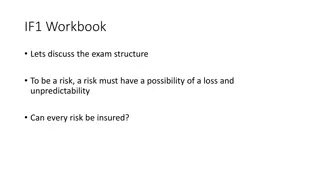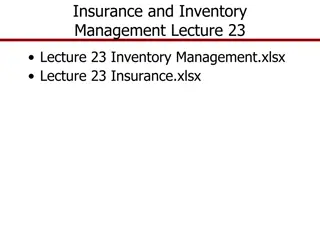Understanding the Importance of Insurance: Types and Coverage Explained
The Insurance Act of 1938 marked a significant milestone in regulating insurance businesses. This legislation aims to protect the interests of insured parties and streamline insurance operations. Insurance plays a crucial role in safeguarding individuals against uncertainties, sharing risks, facilitating global trade, and promoting economic growth. Explore the various types of insurance, including life insurance, general insurance, and fire insurance, each serving different purposes and providing essential financial and medical support in times of need.
Download Presentation

Please find below an Image/Link to download the presentation.
The content on the website is provided AS IS for your information and personal use only. It may not be sold, licensed, or shared on other websites without obtaining consent from the author. Download presentation by click this link. If you encounter any issues during the download, it is possible that the publisher has removed the file from their server.
E N D
Presentation Transcript
INSURANCE Prepared By Sagar Arangale
The Insurance Act of 1938 was the first legislation governing all forms of insuranceto provide strict state control over insurance business. Purpose:- to safe guard the interest of insured, setting the norms for carrying out the business of insurance smoothly, Minimizingdisputes
INSURANCE ACT1938 Dictionary of business and Finance defines Insurance as a form of contract agreement under which one party agrees in return for a consideration to pay an agreed amount of money to another party to make good a loss, damage or injury to something of value in which the insured has a interest as a result of some uncertain event.
IMPORTANCEOF INSURANCE Provides protection against occurrenceof uncertain events. Device for eliminating risks andsharing losses. Co-operative method of spreadingrisks. Facilitates international trade. Serves as an agency of capitalformation. Financial support. Medical support. Source of employment.
Life Insurance: Life insurance is a contract between the policy owner and the insurer, where the insurer agrees to reimburse the occurrence of the insured individual's death or other event such as terminal illness or critical illness. The insured agrees to pay the cost in terms of insurance premium for exclusions are often written in the contract to limit the liability of the insurer, for example claims related to suicide, fraud, war, riot and civil commotion is not covered. the service. Specific
General Insurance Insuring anything other than human life is called generalinsurance. Examples are insuring property like house and belongings against fire and theft or vehicles against accidental damage or theft. Injury due to accident or hospitalisation for illness and surgery can also be insured. Your liabilities to others arising out of the law can also be compulsory in some cases like motor third party insurance insured and is
Fire Insurance Insurance that is used to cover damage to a property caused by fire. Fire insurance is a specialized form of insurance beyond property insurance, and is designed to cover the cost of replacement, reconstruction or repair beyond what is covered by the property insurance policy. Policies cover damage to the building itself, and may also cover damage to nearby structures, personal property associated with not being able to live in or use the property if it isdamaged. and expenses
Health Insurance A type of insurance coverage that pays for medical and surgical expenses that are insured. Health insurance can either reimburse the insured for expenses incurred from illness or injury or pay the care provider directly. Health insurance is often included in employer benefit packages as a means of enticing qualityemployees. incurred by the
Marine Insurance Marine Insurance covers the loss or damage of ships, cargo, terminals, and any transport or cargo by which property is transferred
PRINCIPLES OF INSURANCE Principle of Insurable interest. Principle of Utmost GoodFaith. Principle of Indemnity. Principle ofSubrogation. Principle of Contribution. Principle of Causa Proxima. Principle of Mitigation ofLoss.
LIFE INSURANCE PLANS TermInsurance. Endowment InsurancePlan. Money Back Policy. Group Life Insurance.
REGULATIONS OF INSURANCE BYIRDA Deposits. Investments. Valuation OfAssets. Submission ofReturns. InsuranceAdvertisements. Foreign Exchangelaws.
ACTS GOVERNING INSURANCE The insurance Act, 1938 to govern all form of insurance and to provide strict control over insurance business. Insurance Regulatory and authority act, 1999 (to provide) for the establishment of an authority to interest of the holder of insurance policy, to regulate, promote and ensure orderly growth of insurance industry and for matter connected therewith or incidental thereto and future to amend the Insurance Act, 1938, the Life Insurance Corporation Act, 1956 and the general insurance business (Nationalization) act, 1972. The Actuaries Act, 2006 (An Act to provide for regulating and developing the profession of Actuaries and for matters connected therewith or incidental thereto). protect the
INSURANCE LAW REGULATIONS Insurance law regulations in India manage all the matters related to various insurance companies in the country. The concept of dates back to the ancient period. insurance in India Entry of Private Companies. RegulatoryAuthorities. Insurance Regulatory and Development Authority.
INSURANCE REGULATORY& DEVELOPMENT AUTHORITY Insurance Regulatory & Development Authority is regulatory and development Government of India in order to interests of the policyholders and to promote and ensure orderly growth insurance industry. authority under protect the regulate, of the Powers and Functions ofIRDA. Impact Of IRDA On Indian InsuranceSector.























